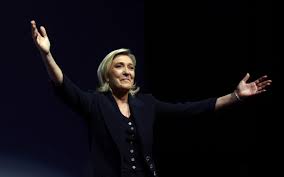Paris: President Emmanuel Macron’s party has suffered a crushing defeat in the French parliamentary elections. In this election, the leftist coalition has become the largest force in the French Parliament. At the same time, Marine Le Pen’s far-right party National Rally has slipped to third place. No one has got a majority in this election but it has raised a big question mark for French President Emmanuel Macron. In such a situation, the question is arising whether Emmanuel Macron will resign from the post of President. Macron had won for a new term during the elections last year.
The surprising results of the elections show that France’s leftist coalition – New Popular Front – has won 182 seats, followed by President Emmanuel Macron’s centrist Together coalition with 163 seats and the far-right party National Rally is in third place with 143 seats. But despite coming out on top, the leftist coalition is more than 100 seats short of an absolute majority, leaving the country’s political future in turmoil.

What happened in the polls?
The second round of voting in France saw a huge upset. Pre-poll surveys had predicted that Marine Le Pen’s far-right National Rally would easily win a majority. However, later surveys said that even if the National Rally became the largest party, it would not be able to secure a majority on its own. However, when the results came in, it was revealed that the leftist New Popular Front (NPF) won a surprise victory.
The result led to Prime Minister Gabriel Attal announcing that he would submit his resignation to Macron, but he has also made it clear that he is prepared to remain caretaker prime minister as weeks of political and financial uncertainty loom over the country. Olivier Faure, leader of the Socialist Party, which is part of the NFP coalition, said they would choose a candidate to replace Attal this week “either unanimously or by vote”, but the choice would be difficult.

Why are the results an issue for Macron?
Many commentators have said the results could spell trouble for Macron. In France, while the president chooses the prime minister, the appointment must be made according to the political makeup of the National Assembly. This means the president must choose a candidate from the largest party/coalition. Currently, this means he must choose someone from the left-wing NFP.
This means President Macron and the prime minister will be from different political parties and have opposite views on how the country should be governed. Most of the government in France has been run by the same party. However, there have been a few instances where the prime minister and president are from different parties. Most recently when socialist Lionel Jospin was prime minister under right-wing president Jacques Chirac. In 2000, France saw several major reforms passed, including those opposed by the president. For example, Jospin passed a reform to reduce working hours from 39 to 35 a week under Chirac’s presidency.

Will President Macron resign?
Given these circumstances, Macron, whose term runs until 2027, may choose to resign in the face of political deadlock. However, Macron has clearly stated that he will not resign “whatever the consequences”. And on Monday (July 8), the Elysee Palace released a statement that Macron will ‘wait’ for a decision to be made about a new government. “In his role as guarantor of our institutions, the president will ensure that the sovereign choice of the French people is respected,” the French presidential palace Elysee said.




